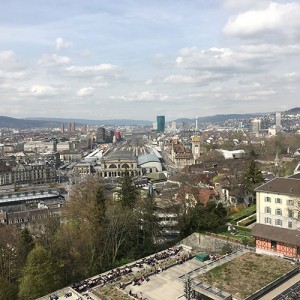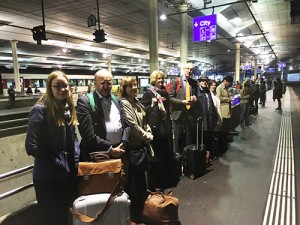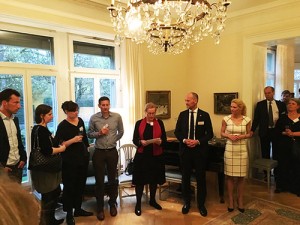The Management Council spent this week travelling through Germany and Switzerland, visiting some of Europe’s most prominent universities. The purpose of the trip was to draw comparisons, learn, gather inspiration, and find out what the most pressing issues of our hosts are. Processing and reflecting on all our impressions will take a few days. We have been graciously received at every part of the journey. Everyone has been generous and open in sharing experiences, challenges, problems, and reasons for joy.
On Monday, we visited the University of Tübingen. It is one of our sister universities in the Matariki Network (‘the Seven Sisters’). Tübingen has many similarities to Uppsala. Both universities were founded in 1477 – in other words, we are twin sisters – yet remain modern, expanding seats of learning to this day. We had an open conversation focusing on the German initiative for excellence, Tübingen’s strategies for internationalisation and recruitment, ways to develop our already quite extensive research collaborations, and ways for us as universities to contribute to the social inclusion of newly arrived refugees. This October, possible research collaborations will be made concrete as a delegation of researchers from Tübingen will arrive in Uppsala.
The next morning, we arrived by train to Zürich, where we set off for ETH Zürich in brilliant spring weather.
With 21 Nobel laureates, this primarily science-and-technology-centric university is ranked among the top ten academic institutions of the world. The focus of the conversation was management and governance, funding, international recruitment, and career paths. There are many similarities, but also differences. We are envious of their large amounts of direct funding, which is an important reason for their long-term and consistent recruitment strategy. Already this May, more people at Uppsala University will learn how ETH do things in regards to recruitment and career paths. Then, Madeleine Lüthy from ETH is set to visit Uppsala University to hold a seminar for our recruitment groups, and stop by our welcome reception for researchers at the Human Resources Division.
After an intense day, we had a new train journey ahead of us, this time to Bern. Together with the Swedish embassy in Bern, we arranged an evening seminar related to EIT Health. Following a presentation by the UU coordinator for EIT Health, Professor Mats Larhed, we held a panel discussion with representatives of two of our Swiss partner universities, ETH Zürich and EPFL, as well as two representatives of the industry (Roche Diagnostics and ThermoFisher). The topic of discussion was how EIT Health can contribute to innovations and better health in Europe by fostering collaboration between universities and companies.
After the seminar one of our successful alumni, the Swedish ambassador to Switzerland, Magnus Hartog-Holm, hosted a reception for other alumni and friends. The reception was attended by more than 80 people. Tired but very content, we returned to the hotel.
The next morning saw us embarking on our last visit, to the EPFL (École Polytechnique Féderale de Lausanne). We arrived after yet another punctual and beautifully scenic train ride, with vistas including both Alps and lakes. The EPFL are universities that through determined investments in international recruitment and an American-style tenure track system have established themselves as some of the most prominent European universities in the 2000’s. They have 10 000 students, around 400 professors, a campus that has been incrementally constructed by the shoreline of Lake Geneva since the 1960’s and onward. EPFL too has a science-and-technology-centric profile. Our conversation here also touched on internationalisation, governance, and international recruitment, as well as the working conditions of researchers. We were also treated to a walking tour of the campus, with visits to various laboratories. Here, researchers share common platforms and infrastructures. One of their more recently erected buildings, the Rolex Centre, has received an international design prize for its architecture, with a deliberate lack of right angles and flat floors – it was rather spectacular. We also enjoyed a fond reunion with Professor Anders Hagfeldt, who moved to EPFL about a year ago, but who keeps in touch with Uppsala. He disclosed some similarities and differences from his perspective.
Following a final train trip to Geneva, we were homeward bound by flight. Three universities and an alumni event in three days. Intense, with several meetings, plenty of time spent on both airplane and train, but also highly instructive and inspiring.



